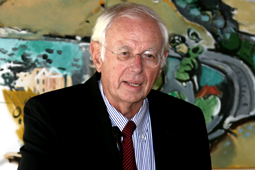German ambassador calls for greater globalization
Scharioth suggests Germany will continue to encourage nuclear non-proliferation

German Ambassador Klaus Scharioth
“In today’s world, practically all challenges are of a global nature,” said Dr. Klaus Scharioth. “The structures we have must be adapted to the problems. We need global solutions.”
Scharioth’s remarks at Brandeis, made during a luncheon forum hosted by the Perlmutter Institute for Global Business Leadership and the Center for German and European Studies addressed the gamut of pressing international issues, from the economic crisis to nuclear proliferation and climate change.
Scharioth suggested that Germany will continue to encourage the international community to address a nuclear non-proliferation solution quickly. Reflecting on the fear the country lived with during the Cold War period, he warned that “today we are in a more dangerous situation. If we don’t take action rapidly, you’ll no longer have eight nuclear-capable countries but 25. There will be no red telephones between the countries.”
Scharioth argued that the U.N. Security Council should be enlarged to give it more legitimacy in pursuing its mission of maintaining international peace and security. “Why is China on the Security Council and not India, the largest democracy in the world?” he asked, adding that other regions such as Latin America and Africa also should be added in order to enhance the council’s effectiveness.
A seasoned diplomat with over 30 years of international relations experience, Scharioth pointed to the recent formation of the European External Action Service as an illustration of a positive organizational change in response to the new global environment. The joint diplomatic corps aims to represent the European Union and “help us speak in one voice,” he said.
Scharioth, who is credited with helping establish the Trans-Atlantic Climate Bridge, a sustainable network of trans-Atlantic cooperation to combat climate change, also reported that Germany will continue to focus on shifting toward a higher mix of renewable energy sources. The country expects to reduce its CO2 emissions by 80 percent by the year 2050.
Categories: International Affairs





